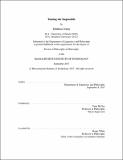| dc.contributor.advisor | Vann McGee. | en_US |
| dc.contributor.author | Jenny, Matthias (Matthias Christian) | en_US |
| dc.contributor.other | Massachusetts Institute of Technology. Department of Linguistics and Philosophy. | en_US |
| dc.date.accessioned | 2018-02-16T19:27:30Z | |
| dc.date.available | 2018-02-16T19:27:30Z | |
| dc.date.copyright | 2017 | en_US |
| dc.date.issued | 2017 | en_US |
| dc.identifier.uri | http://hdl.handle.net/1721.1/113731 | |
| dc.description | Thesis: Ph. D. in Philosophy, Massachusetts Institute of Technology, Department of Linguistics and Philosophy, 2017. | en_US |
| dc.description | This electronic version was submitted by the student author. The certified thesis is available in the Institute Archives and Special Collections. | en_US |
| dc.description | Cataloged from student-submitted PDF version of thesis. | en_US |
| dc.description | Includes bibliographical references (pages 147-157). | en_US |
| dc.description.abstract | The semantic paradoxes and other statements about impossibilities have proved to be obstacles to a satisfactory theory of conditionals. In my dissertation, which consists of two parts, I propose a new approach to the impossible that yields an improved theory of conditionals. A prominent response to the semantic paradoxes is glut theory. Glut theorists avoid paradox by giving up material modus ponens. But they argue that they can help themselves to this rule in areas where no paradoxes loom. In chapter 1, I argue that this does not work and that giving up modus ponens in paradoxical domains leaves glut theorists with a weak logic everywhere. One option that's available to glut theorists involves pragmatic innovation. In chapter 2, I explore the consequences of giving glut theorists the pragmatic resources that are already available the proponents of gap theory, the dual of glut theory. The resulting hybrid theory, which makes use of two distinct speech acts of assertion, is glap theory. Surprisingly, the logic of glap theory is a quite strong logic that adds to the logics of glut and gap theory two hybrid forms of modus ponens. Turning to counterfactual conditionals, the second half of my dissertation concerns the vacuity thesis, which says that all counterpossible conditionals are vacuously true. In chapter 3, I argue that the strongest case against the vacuity thesis comes from counterpossibles as they appear in relative computability theory. I show that relative computability theorists crucially invoke counterpossibles when they define the central notions of their theory. I also provide a model theory for a quantified language that can express such counterpossibles. The logical properties of counterfactuals about relative computability deserve closer attention. In chapter 4, I provide an axiomatization of a propositional fragment of the model theory developed in chapter 3 and prove that the axiomatization is complete and that the resulting conditional logic is decidable. This logic display some surprising features. While validating modus ponens, it also contains a restricted form of the import-export law. | en_US |
| dc.description.statementofresponsibility | by Matthias Jenny. | en_US |
| dc.format.extent | 157 pages | en_US |
| dc.language.iso | eng | en_US |
| dc.publisher | Massachusetts Institute of Technology | en_US |
| dc.rights | MIT theses are protected by copyright. They may be viewed, downloaded, or printed from this source but further reproduction or distribution in any format is prohibited without written permission. | en_US |
| dc.rights.uri | http://dspace.mit.edu/handle/1721.1/7582 | en_US |
| dc.subject | Linguistics and Philosophy. | en_US |
| dc.title | Taming the impossible | en_US |
| dc.type | Thesis | en_US |
| dc.description.degree | Ph. D. in Philosophy | en_US |
| dc.contributor.department | Massachusetts Institute of Technology. Department of Linguistics and Philosophy | |
| dc.identifier.oclc | 1022566232 | en_US |
